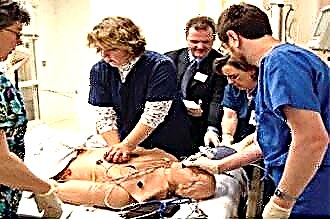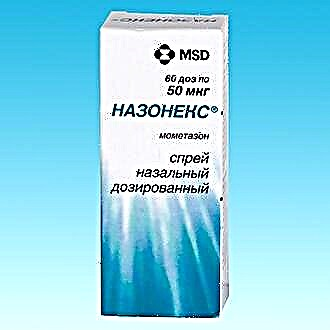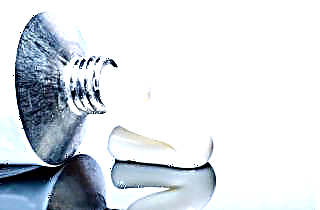Most cases of angina are caused by a bacterial infection. But in some situations, viruses can also be the cause of the development of this disease. This pathology is dangerous primarily because viral angina has a high risk of a wide variety of complications.
In order to find out what exactly caused the development of the disease, and therefore to choose the correct treatment for herpetic sore throat, you should consult a doctor. Of the viral infections, this disease is most often caused by the herpes virus.
 Herpangina usually has a rather sharp and pronounced onset with a sudden high fever, against the background of the seemingly general well-being of the patient. Very quickly, other symptoms of the disease join the fever - sore throat, general weakness, difficulty swallowing, hoarseness, etc.
Herpangina usually has a rather sharp and pronounced onset with a sudden high fever, against the background of the seemingly general well-being of the patient. Very quickly, other symptoms of the disease join the fever - sore throat, general weakness, difficulty swallowing, hoarseness, etc.
In order to accurately identify the cause of the throat lesion, a smear taken from the patient's throat should be cultured on a nutrient medium. This study is carried out in a laboratory and gives an accurate answer to the question about the nature of the disease, which means that it allows you to choose the most effective treatment tactics for a particular patient.
Specific therapy
To date, medical science has not yet created reliable means to fight viral infections. At the same time, many non-professionals do not see much difference between viral and bacterial infections, believing that both can be effectively treated with antibiotics. This is completely wrong - herpangina, like other viral diseases, cannot be treated with antibiotics.
Important! Not a single pharmaceutical drug, which is called "antiviral", has not passed reliable clinical trials to date. The ability of all such drugs to cure a viral infection is still in doubt.
Our own immune system has been and remains the leading means of killing viruses so far. Therefore, the main purpose of the use of pharmacological drugs for viral angina is to support immunity and enhance its action. An important factor is also the suppression of symptoms - this will help the body to focus all its reserves on the fight against the main cause of the pathology.
Correct treatment of herpes sore throat in adults in the vast majority of cases demonstrates excellent results. Competently selected symptomatic therapy, as well as support for the immune system, allows you to get rid of the disease in just 5-6 days. This is the minimum time that our body needs to form a full-fledged immune response and suppress a viral infection.
Immune system activation
Treatment of herpetic sore throat by intensive stimulation of the immune system includes several measures at once:
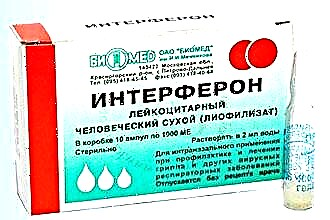 Administration of interferon to the patient. It is a class of proteins that are the backbone of the immune system and suppress the multiplication of viruses. They are synthesized in the human body, but this process is quite long. Therefore, it can be accelerated with medication by introducing interferons, completely analogous to human, from the outside.
Administration of interferon to the patient. It is a class of proteins that are the backbone of the immune system and suppress the multiplication of viruses. They are synthesized in the human body, but this process is quite long. Therefore, it can be accelerated with medication by introducing interferons, completely analogous to human, from the outside.- Using a diet that contains an increased amount of protein that is easy to digest. An example of such a product is chicken meat. Protein is needed by the immune system in order to produce substances that will treat viral diseases.
- Appointment of multivitamins and mineral complexes. A large amount of these compounds is consumed by the body during the intensive work of the immune system - it is necessary to replenish their reserves in time.
- The use of funds to stimulate the immune system. This includes, first of all, some herbal remedies, for example, echinacea, eleutherococcus, ginseng, etc.
- Increasing the content in the patient's diet of foods that enhance the hematopoietic function (red fruits, animal liver, etc.).
Symptomatic treatment
These drugs are used to alleviate the patient's condition and relieve the symptoms of the disease. First of all, the treatment of herpes sore throat involves the use of drugs that can reduce the intensity of inflammation and reduce the severity of pain. With this pathology, infusions and decoctions of medicinal herbs have proven themselves well:
- pharmacy chamomile;
- Hypericum perforatum;
- medicinal sage;
- oregano;
- yarrow;
- calendula;
- linden;
- horsetail, etc.
Important! Before using herbal remedies, you should make sure that the patient is not allergic to these medicinal compounds.
Treatment of herpetic sore throat with medicinal herbs includes both throat flushing and inhalation, delivering active substances to the inflamed area in the form of vapors. In addition, numerous lozenges, sprays and solutions sold in ready-made form in pharmacies are also used to relieve inflammation and pain relief. These are such drugs. how:
- Tantum Verde;
- Decatilene;
- Septolet;
- Neo-angina;
- Trakhisan and a number of others.
Conditions for finding the patient
Correct treatment of herpes sore throat also implies adherence to certain recommendations for changing lifestyle during the period of illness:
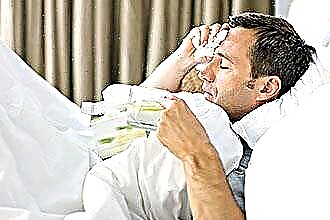 The patient is shown strict bed rest. This will save him from hypothermia, especially at an early stage of pathology.
The patient is shown strict bed rest. This will save him from hypothermia, especially at an early stage of pathology.- It is necessary to reduce as much as possible the number of contacts between the patient and the people around him, since the patient is an active distributor of a viral infection. Infection with the virus is especially dangerous for pregnant women, in whom herpangina can cause complications in the form of a violation of the processes of fetal formation.
- The patient's room should be warm but periodically ventilated. This is necessary to prevent the addition of secondary infections.
- The patient is shown an abundant drink in the form of fruit drinks, compotes, teas, fruit juices or just non-carbonated mineral water. This will increase the elimination of toxins from the body and contribute to a decrease in body temperature.
- Also, the patient is advised to remain silent more - this will save the already sore throat from excessive stress and stress.
- During the period of illness, warm food of soft consistency should be preferred that does not contain hot spices, smoked meats and other aggressive compounds. This will minimize the possibility of chemical or mechanical injury to the throat mucosa.
Prevention of complications
 Herpangina is an indicator that the patient has a certain "gap" in the natural defense of the body, the immunity has missed the infectious agent and allowed the disease to develop to the clinical stage. And this, in turn, means that the risk of joining and other infectious pathologies, mainly of a bacterial nature, increases significantly.
Herpangina is an indicator that the patient has a certain "gap" in the natural defense of the body, the immunity has missed the infectious agent and allowed the disease to develop to the clinical stage. And this, in turn, means that the risk of joining and other infectious pathologies, mainly of a bacterial nature, increases significantly.
This pathology requires mandatory measures to prevent the development of bacterial complications in the form of severe inflammatory lesions of the kidneys, rheumatic diseases of the heart and joints, inflammation of the salivary glands, etc.
Secondary bacterial infection should be treated with antibiotics. Most often, classes are used that have the widest possible range of effects on microorganisms - cephalosporins, macrolides, etc. For more effective treatment, it is necessary to take biological material from the patient and isolate a bacterial culture from it. Then it is tested for sensitivity to certain types of antibiotics.According to its results, the types and scheme of drug use can be adjusted.
Also, local antiseptics that are not antibiotics are also used to fight bacterial infection:
- A good remedy that can effectively destroy the vast majority of pathogenic microorganisms is iodine. Usually, for viral sore throat, gargle with a solution that includes iodine and soda in equal amounts is used.
- It is also possible to treat a secondary infection with the help of pharmaceutical disinfectants, which include, for example, agents such as furacilin or stomatidin.
- Chlorophyllipt, a preparation obtained from eucalyptus leaves, also has a very pronounced antibacterial effect.
- It is possible to effectively treat a bacterial disease with angina with the use of folk remedies, such as, for example, aloe tincture.
- The well-known garlic also demonstrates a strong disinfecting effect. It contains specific compounds called phytoncides. They have the ability to quickly kill most pathogenic bacteria through direct contact.

 Administration of interferon to the patient. It is a class of proteins that are the backbone of the immune system and suppress the multiplication of viruses. They are synthesized in the human body, but this process is quite long. Therefore, it can be accelerated with medication by introducing interferons, completely analogous to human, from the outside.
Administration of interferon to the patient. It is a class of proteins that are the backbone of the immune system and suppress the multiplication of viruses. They are synthesized in the human body, but this process is quite long. Therefore, it can be accelerated with medication by introducing interferons, completely analogous to human, from the outside. The patient is shown strict bed rest. This will save him from hypothermia, especially at an early stage of pathology.
The patient is shown strict bed rest. This will save him from hypothermia, especially at an early stage of pathology.